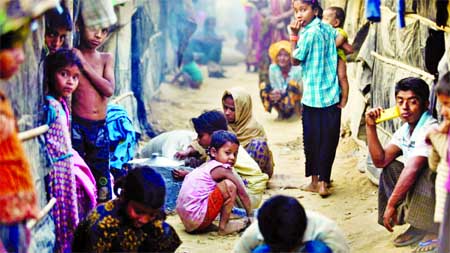
Kazi Zahidul Hasan :
While the bilateral pressure is on, the Bangladesh government simultaneously continuing its efforts in multilateral fronts for creating safe and conducive environment in Rakhine State of Myanmar for sustainable return of Rohingya refugees and stop recurrence of their influx.
The planned repatriation of Rohingya refugees back to Myanmar was scheduled to begin on January 23. But it has been postponed as many Rohingyas have expressed worries saying they do not feel safe returning home due to prevailing situation in Rakhine.
The UN and global community also expressed concern over the safety of the Rohingyas if they return to their homeland.
“Our government is working with Myanmar and international community to ensure a safe and conducive environment in Rakhine. The repatriation process is being delayed due to growing concern over safety and security of Rohingyas to their homes,” State Minister for Foreign Affairs Shahriar Alam told reporters at the Rohingya camp in Cox’s Bazar.He said we are continuing our pressure on Myanmar along with international forums for the quick and safe return of the Rohingya refugees.
“Rohingyas would be sent back home after they want to go there voluntarily under a
favourable environment. An agreement has been signed to involve UNHCR in Rohingya repatriation,” he added.
Since August last year about 700,000 Rohingyas have entered Bangladesh in the wake of a military-led campaign in Rakhine State what the UN termed as “ethnic cleansing”. They poured into over-crowded camps in Cox’s Bazar, bringing with them harrowing tales of rape, murder and torture at the hands of Myanmar’s army or Buddhist mobs. “All procedures to send back Rohingyas is near to be completed,” Mohammad Habibul Kabir Chowdhury, Head of Rohingya Cell at the Ministry of Disaster Management and Relief told The New Nation yesterday.
He said the authorities have determined five transit camps for the repatriation of Rohingya refugees to their homeland in Myanmar. The Refugee Relief and Repatriation Commissioners (RRRC) office in Cox’s Bazar has given the responsibilities of transit camp management and repatriation with the supervision of UNHCR.
Two camps will be set up at Nayapara and Ghundum and the kick off the repatriation will start from one of them.
“We have already signed a deal with the UN Refugee Agency on data exchange on Rohingya refugees. The list of Rohingyas on the basis of their families and the villagers in Myanmar has been completed. The original address in Rakhine is properly reflected in the family database. The list will be sent to the Myanmar authorities for verification. If the list is verified we will go for the repatriation,” said Mohammad Habibul Kabir Chowdhury.
When asked, he said, the lists of those entitled and willing to return to their home to be sent to the Myanmar authorities. We want to assure the international community that only those wishing to go back to their homeland in Rakhine would be sent to Myanmar, and the process would involve the UN’s refugee agency.
“As tension growing in Rohingya camps, information campaign would be launched to inform the refugees about the present development in Rakhine State to ensure the voluntary return,” an official at RRRC told The New Nation, seeking anonymity.
He said some international and local media are spreading misinformation about the return arrangement causing tension in the Rohingya camps. ‘We would develop a communication strategy for Rohingya on the safe and voluntary repatriation involving relevant stakeholders,” he added.
The official further said extra police and Ansar members, along with five executive magistrates have been deployed in two police stations to maintain law and order in the camp area. The local administration has also issued notice under CRpc to restrict movement in and around the camps after 5:00pm.
Refugees have been banned from leaving the overcrowded camps. Police check posts and surveillance have been set up in key transit points to stop Rohingya from travelling to other parts of the country.
The law enforcers have so far sent 46,000 Rohingays to two camps in Cox’s Bazar from different parts of the country.

